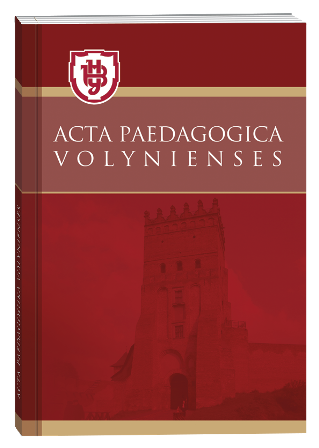THE ROLE OF A CREATIVE TEACHER IN THE DEVELOPMENT OF EDUCATIONAL INNOVATIONS
DOI:
https://doi.org/10.32782/apv/2022.1.2.11Keywords:
creative personality, teachers, innovative pedagogical activity, educationAbstract
The article is devoted to the study of the current problem of development of educational innovations, as well as the activities of creative teachers. The article analyzes the tasks set by innovation. It is noted that the general task of innovative learning is to form a person’s readiness for dynamic changes in society through the development of creative abilities, various forms of thinking, as well as the ability to cooperate with other people. Innovative pedagogical activity is a purposeful pedagogical activity based on the understanding of practical pedagogical experience and aimed at changing and developing the educational process in order to acquire new knowledge, form a qualitatively different pedagogical practice and achieve higher results, and its products are innovations. which qualitatively change the educational system, determine its further development. The ways and results of updating pedagogical systems at different levels are revealed. It is established that innovative pedagogical activity can be carried out both in traditional educational institutions and in new type of institutions in different ways and perform different functions. The pedagogical process is considered as joint creativity (co-creation) of the teacher and pupils in a situation of pedagogical interaction in the course of which there is a pedagogical transformation of the person, and creativity is a leading feature of the personality of the modern teacher-innovator. Attention is paid to the reasons for unwillingness to change the style of teachers, as well as by forming an active creative environment. The article substantiates that a significant impetus to the development of educational innovations should be a new look at monitoring the quality of education - the basis for assessing the effectiveness of education should not be success and quality of knowledge, and the personality of the participant in the educational process.
References
Альтшуллер Г.С., Верткін І.М. Як стати генієм: Життєва стратегія творчої особистості. Мінськ : Білорусь, 1994. 479 с.
Амонашвили Ш.А. Здравствуйте дети. Москва : Просвещение, 1983. 185 с.
Бердяев Н.А. Самопознание : Сочинения. Харьков : Фолио, 1999. 620 с.
Бодалев А.А., Рудкевич Л.А. О субъективных факторах творческой деятельное человека. Педагогика. 1995. № 3. С. 19.
Ващенко Л.М. Інноваційна політика як динамічна система управління освітою. Педагогічні інновації столичної освіти: теорія і практика : науково-методичний щорічник. Київ, 2001. С. 277–289.
Выготский Л.С. Мышление и речь. Изд. 5-е., испр. Москва : Лабиринт, 1999. 352 с.
Дичківська І.М. Інноваційні педагогічні технології : навчальний посібник. Київ : Академвидав, 2004. 352 с.
Доман Г. Гармоничное развитие ребенка / Пер. с англ. Москва, 1996. 285 с.
Рындак В.Г. Непрерывное образование и развитие творческого потенциала учителя (теория взаимодействия) : монография. Москва : Педагогический вестник, 1997. 244 с.
Ковальчук О. Інноваційна робота як проблема професійного удосконалення вчителя. Директор школи, ліцею, гімназії. 2002. № 1–2. С. 51–52.
Монтессорі М. Метод наукової педагогіки, що застосовується до дитячого виховання у Будинках дитини. Москва : Тип. Госснаба, 1993. 168 c.
Митина Л.М. Учитель как личность и профессионал. Москва, 1994. 215 с.
Попова О.В. Становлення та розвиток інноваційних педагогічних ідей в Україні у ХХ столітті. Харків. 2001. 175 с.







